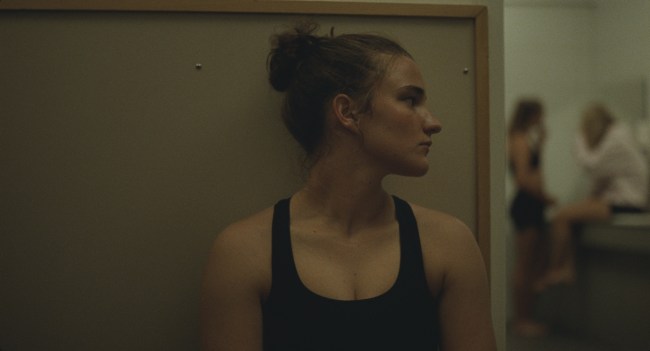After the star graduate of an elite Belgian tennis academy commits suicide, her shocking death triggers an investigation into the late teenager’s relationship with the (now suspended) older male coach who’d been so instrumental to her success. That investigation gradually but inevitably comes to focus on the coach’s latest protégé, who’s spent the last several years under his wing, and is on the cusp of qualifying for the Belgian Tennis Federation. People can’t help but suspect that she knows a thing or two about how coach Jeremy (Laurent Caron) treats his pupils when no one else is around to see. Her friends, her parents, the administrators at her school… everyone is eager for her to fill in the blanks, but Julie keeps quiet.


Needless to say, Leonardo Van Dijl’s “Julie Keeps Quiet” doesn’t regard that as much of a spoiler. This impressive debut feature — cold as a crypt and yet enormously sensitive all at once — is never framed like a mystery, or at least not like the mystery that you might expect from its premise.
As the title of the film makes clear from the start, the question at the heart of this story isn’t whether Julie (first-time actress and veteran tennis player Tessa Van den Broeck) will speak up, or even what she might reveal if she did. The question at the heart of this film — which is executive produced by Naomi Osaka and co-produced by the Dardenne brothers — is why Julie chooses to remain silent, and the overlapping array of possible answers provided by Van Dijl and Ruth Becquart’s script allows this sober coming-of-age story to mature into an absorbingly implosive portrait of a girl learning to listen to herself.
Or at least to listen to herself clearly, because it’s not as if a multitude of outside voices have been finding their way into Julie’s head — only one, Coach Jeremy’s, whose thoughts have suffused into her own. Cinematographer Nicolas Karakatsanis shoots the girl as if she were a perfect echo chamber, his 35mm frames smothering Julie with a soft focus that makes her feel like she’s worlds away from her friends on the next court over.
Maybe that’s why the opening scene finds Julie practicing her strokes by herself as she chases an invisible ball across the baseline for minutes on end, the tennis equivalent of shadowboxing. This will hardly be the last time that Van Dijl drills his attention into Julie’s monastic training routine, as if the star athlete were trying to sublimate herself into the sport that has come to define her, or as if she had never learned any other way of expressing herself (at one point we see her flip through an old photo album that seems to cover the last decade of her life, and she’s holding a racket in every picture).
Julie is a warrior, but that perseverance belies the vulnerabilities in her game. In the chipper and smiling interview footage she watches of her dead predecessor, Aline, the older girl beams that Coach Jeremy taught her how to be in control of her emotions (the crushingly dark irony of that claim is the closest this movie comes to a sense of humor), and we realize that Julie has been conditioned to play through any kind of pain. To speak out would fly in the face of her training.
A more prescriptive film might build to a scene in which she breaks down and tells her parents everything that Jeremy did to her, but “Julie Keeps Quiet” — again, per its title — eschews any trace of melodrama in favor of highlighting subliminal moments of self-discovery. Once proud to be the academy’s brightest prospect, Julie blanches when her kind new coach Backie (Pierre Gervais) stops practice so that the rest of the students can admire her footwork. The investigation has obviously made her wary of the spotlight, but every scene in this film probes a bit deeper than that; in this instance, it led me to wonder if Julie might have felt herself following in Aline’s footsteps, and if that had made her newly reluctant to serve as a model for the other girls.
We’re with the character for every millisecond of this movie, and yet Van den Broeck’s performance — steely but searching — never betrays any of Julie’s secrets. The actress implicitly recognizes that Julie’s silence is her greatest strength. Some of the people in her life, and some of the people in Van Dijl’s audience, might argue that she lacks the courage to speak her truth, but “Julie Keeps Quiet” is so honest and humane precisely because Julie has the courage to make sense of that truth for herself before she agrees to share it with the world (it’s the cinematic equivalent of watching Novak Djokovic bounce the ball 100 times before he feels confident in the serve to come).
With Jeremy sidelined from taking on new students, Julie’s silence creates its own kind of safety, especially as it compels the people around her to show their cards. It’s through her silence that Julie can appreciate Backie’s sincerity, and how the school administrator’s concern for Julie’s well-being hides her even greater concern for a scandal.
The longer the film goes on, the more it seems like Julie’s silence is freighted with valuable information, and the sterility of Van Dijl’s approach — his aesthetic as redolent of Michael Haneke in its remove as it is of the Dardenne brothers in its focus — soon comes to assume its own intensity of feeling. We’re able to glean a few key details from the one and only scene in which Julie meets up with Coach Jeremy in person (his profile always gripped in shadow, his compliments all dangerously backhanded), but we’re able to parse so much more from the wordless reveal that Julie secretly recorded their conversation.
Van Dijl never budges from that mode of pressurized introspection, and “Julie Keeps Quiet” can occasionally feel a bit anemic and repetitive as a result of that tight-lipped discipline. The film breathes a little bit as Julie starts to come out of her shell and take stock of how Jeremy might have isolated her from the rest of the world (there are a number of hazily drawn scenes in which she begins to reconnect with her friends), but it’s not as if she ever finds the words to articulate the details of her experience, or to indicate the severity of the trauma that it left behind.
And yet, “Julie Keeps Quiet” is so affecting precisely because it refuses to become a movie about what its namesake has to say. On the contrary, this is a movie about what she’s able to find in a silence that she never recognized as such until everyone asked her to speak, and it’s because of that silence that Julie is ultimately able to discover the power of her own voice.
Grade: B
Film Movement will release “Julie Keeps Quiet” at the Metrograph for a one-week run beginning on Friday, March 28.
Want to stay up to date on IndieWire’s film reviews and critical thoughts? Subscribe here to our newly launched newsletter, In Review by David Ehrlich, in which our Chief Film Critic and Head Reviews Editor rounds up the best new reviews and streaming picks along with some exclusive musings — all only available to subscribers.


AloJapan.com